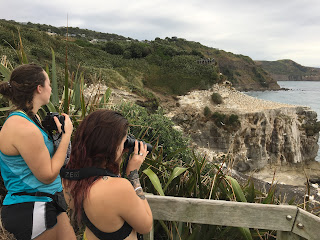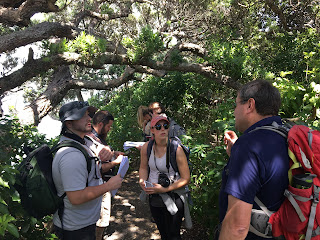Another beautiful day in Auckland began with a drive out to Leigh, about an hour north of the city. There, we our first stop was at the Goat Island Dive and Snorkel Shop where we picked up our gear to snorkel around the Goat Island Marine Reserve that afternoon. We popped in to see Tina and the crew to get outfitted with gear and then we were off to the Goat Island Discovery Centre to hear about the origins of the Centre and the current research taking place in the marine reserve just off shore of the Centre (how sweet is that, ecology folks?!).
We checked-in at the Discovery Centre and were met by two knowledgable and friendly folks: Angela, a former marine sciences technician and now assistant to the Centre’s director, and Ashley, an Auckland University PhD student in marine science. We learned about the strong-tie between the local community and the marine reserve, and the benefits the reserve has to the fishery outside of the reserve. We saw interesting video footage that appeared to demonstrate a rise in species richness and abundance as a result of the establishment of the Goat Island Marine Reserve, as well as other marine reserves within the Hauraki Gulf. With the increase in species diversity, the intricate food web off the coast was maintained. The students commented on how ‘cool’ it was that local community members thought the preservation of species in the marine environment was important and questioned why more people in the US don’t get involved to preserve the country’s natural world. Good question!
Ashley then treated us to an introduction to some of the common invertebrates found in the marine reserve using the animals in the Centre’s ‘touch tank’. The students had the opportunity to handle several species of sea stars, observe what happens when a predatory sea star attacks a scallop, and be personally ‘attacked’ by a sea anemone. Very cool stuff, indeed.
Sam Keeney (Nursing ‘20) holding a sea star from the touch tank. We learned this particular species of sea star is not a predator of scallops.
Sara Wernick (Sociology ‘20) holding a brittle sea star at the Goat Island Marine Discovery Centre touch tank.
Amanda Krom (Nursing ‘20) holding a third species of sea star in the touch tank.
Following lunch, we suited up for a swim in the Goat Island Marine Reserve and were fortunate to see an octopus (great find, Jenna Albanese (Nursing, ‘19)!), squid, pipers, snappers, and many as-of-yet unidentified fish species. The water was a bit chilly but we managed a good 1.5hr swim thanks to the recommendation from Tina at the dive shop to wear the long wetsuits rather than the shorties! Swimming worked-off our lunches, so we fueled up for our visit to Muriwai Beach later in the afternoon with an ice cream stop in Matakana. A good start to the afternoon!
Across the North Island from Leigh and Auckland, lays the west coast, an area dominated by black, volcanic-origin, sands. The sand was extremely fine, much finer than what is typically found on Jones Beach (Long Island, NY)! A few students took a dip in the Tasman Sea, while several others lounged on the enormous beach. Instead of lounging around, I walked with Sara Wernick (Sociology, ‘20) and Emily Stanek (Nursing, ‘19) to visit the nearly Australasian Gannet colony high on the bluffs above the beach. What an amazing opportunity to see seabirds up-close and personal! About 2000 birds, half of which were nestlings, could be seen sleeping, preening, greeting newly-arrived mates, or fighting with interlopers on the colony. A huge range of young birds could be seen on the colony: some only 1 week old; others probably at least 6 weeks old. And, some parents were still sitting on eggs; probably not good news considering that it’s the middle of summer already!
Emily Stanek (Nursing ‘19) and Sara Wernick (Sociology ‘20) watching the Australasian Gannet colony at Muriwai Beach.
The year 2017 finished out with all of us going out for meals and watching the fireworks get launched off the Sky Tower in Auckland’s City Central. With the closing of the year, it’s safe to say that we all feel very fortunate to have our health, families that love and miss us, and the wonderful opportunity to visit New Zealand. Here’s to good health and success to all in the new year!

















